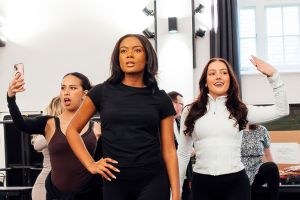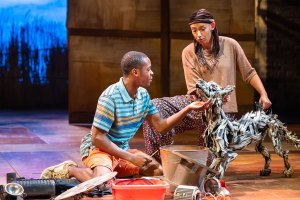Rufus Norris On … Vernon & Verbatim Theatre
Rufus Norris came to prominence in 2001 with the Young Vic’s production of Afore Night Came for which he won the Evening Standard Award for Most Promising Newcomer. Amongst his other stage credits are the 2008 revival of Les Liaisons Dangereuses, his 2003 production Festen at the Almeida, the 2006 Lyric Theatre production of Cabaret and the recently closed West End production of The Country Girl starring Martin Shaw and Jenny Seagrove.
Also coming up for Norris is National Theatre’s recently announced London Road which brings the horrors of the 2006 Ipswich serial killings – in which five women were found murdered – to the Cottesloe stage in a piece of verbatim theatre created by Alecky Blythe.
With some of the script set to music, the production has already attracted criticism, but I asked Norris about putting such a sensitive issue in front of audiences as well as revisiting Vernon God Little — a production which centres on a teenage boy who has survived a high school massacre.
Can you tell us a little bit about Vernon God Little?
It’s an adaptation of the novel by DBC Pierre which is an incredible piece of literature. It’s a very funky and dynamic satire on American gun culture and from the aspect of American populist television life. It’s the story of a boy whose best friend massacres everyone in their class except Vernon and then kills himself. It’s also about how the community responds. Eventually through the shock and grief and the opportunism of one particular character they all point the finger and Vernon.
The start of the story follows his increasingly desperate attempts to extricate himself, while at the same time he’s obviously suffering his own dose of grief having lost his best friend, trying to get around the awfulness of what’s happened. That all sounds very heavy and there is an underlying darkness to the story, of course, but it is a very raucous, funny, up tempo crazy road movie following this 15-year-old boy as he desperately tires to make things right again.
What changes have you made between the first and second productions at the Young Vic?
It’s a very tall order to try and adapt a book like Vernon God Little and we had a very interesting process first time round and the production did very well. But we all felt that we’d only got three quarters of the way there, so its become much tauter and much more of a theatre piece rather than an adaptation. We’ve lightened up every area the stage, the set, the music particularly is up a few notches, just trying to make the whole thing more dynamic and focused. The heart rings out a bit more than it did last time. It was very funny and it had been successful in the satire, but we really wanted to bring out the human story without loosing any of the joy.
What made you decide to bring this book to the stage?
It’s got a huge heart it’s the most fantastic story. The promise within it it just creates theatre and it really is terrific fun. It’s bespoke for an audience of people that aren’t usually catered for in the normal theatre repertoire. The show appeals to audiences all across the board now but when it really flies is when we’ve got an early twenties audience, perhaps one that doesn’t understand how to behave in a theatre. It’s going down really well and I’ve got no worries about how it’ll go down here, I think it’s great.
Can you tell me a little bit about the music you use in the piece?
A lot of the music is Country and Western which is happy music with sad lyrics. It’s so iconic of Texas and the American South that in a way it represents everything that Vernon is trying to get away from. He himself is an Eminem fan and he’s stuck in this world that sings Country songs. That very much plays into the kind of central dilemma that he’s in. To have an all singing, all dancing cast that uses this music – that represents everything he doesn’t like, and to trap him further – is great. At the same time it makes the whole thing much more joyful.
You previously cast the recently graduated Colin Morgan in the show’s title role, and this time round cast the young actor Joseph Drake. How hard is it to find actors to front a production like this?
Joeseph Drake is a real find and it was quite a big search. We saw a lot of good actors but it’s a very particular kind of venerability and strength that we were looking for. He’s totally got it and is doing really well, he’s a fantastic young actor. You’ve gotta believe that he’s 15 or 16 and there is something about that. Quite often the actors who can handle that kind of pressure get sucked into TV or other work, so you’ve for to try and get them early.
What is it like being given the chance to go back and direct the same piece again?
It’s a brilliant opportunity, you often get to do a piece twice when it transfers or is revived in the normal sense, but you’re normally trying to fix what you created in one context for another. Whether it’s a commercial production that is then being taken on tour or something else, it’s inevitably that there are changes or compromises which are effected by outside influences. The influences are normally financial, and making the whole thing work as a package.
The Young Vic have totally resourced the show again, we’ve had a full rehearsal process, a rewrite and a total redesign. It’s a very, very rare opportunity and we’re all incredibly grateful.
What is it like working with DBC Pierre?
You know he’s great. He’s quite a character. From the beginning he’s been totally supportive and has said that this is art and you have to make it fit to the medium, not the other way round. It’s not about coming to it from the book, its about coming to it as a theatre piece. The principal question you have to ask is why were doing it in this medium. He’s been very supportive about it, to the point where most of the lines are not actually his and aren’t from the novel. He came in a couple of times the first time we did it and he’s been in rehearsal this time. He just came in and bigged everyone up. He’s a real rock and roller and totally gets what we’re trying to do.
You have said that this is a very American story, how does that effect the expectations of a British audience? Have you thought about presenting the show in the States?
I’m not American and in Britain we simply don’t understand Americas gun culture. There are some things which we see about America and the way guns are used that for a British audience are very hard to get our heads round. For an American audience, perhaps that’s a bit easier. There are questions around gun ownership and things, but the show is so much bigger than all of that. There are so many other things going on. We are exposed to American culture to such a degree, we’re all watching the same TV series, we’re brought up on American culture as well.
I’d love to have a go at this show Off Broadway, but I think we’d find aspects of it difficult. The first time round a very good friend of mine who is an American producer saw it and said with his subscription audience he would never get away with it. I don’t really know, but I’d love to have a try.
Are there any future plans which might take Vernon God Little to America?
I think we’re just waiting at the moment. There are no stars in it, the fame of the book has slightly subsided. The show is going very well, there’s fantastic word of mouth about it, but we’ve really got to wait and see what the critics make of it and whether there is a further life for it.
Moving away from Vernon God Little I was hoping to talk to you a bit about London Road which has been announced at the National Theatre. What made you want to direct this story on stage?
I came to that process a long way down the line, it’s very much Alecky Blythe‘s love child really. What Alecky does is go into situations as they are developing and take an absolutely accurate record of what they’ve said, although that’s obviously edited into a slightly more controlled format, but there’s not an “um” or an “ah” which isn’t absolutely transcribed. What Adam Cork has then done is take that and put it to music. Not all of it is sung, about half of it is sung, but they’ve used the speech patterns and the cadences.
It’s not a musical in anything like the traditional sense of the word. It is a piece of verbatim theatre which uses music. It’s not about the prostitutes or about Steve Wright, it’s about the people of the community whose lives have been affected in the two and half years since the bodies have been discovered. It’s a fascinating portrait of an English community and how you respond to mass media invasion, what you do when your little corner of the world becomes the centre of a storm like that. Obviously there’s the fear and the terrible tragedy, the knock on effect. It’s a piece which focuses on the people in the pub and at the market, on the other prostitutes, media cameramen who came in to cover it, policemen.
How does it effect you as a director knowing that the material you are working with is made up of real lives and real events?
Alecky is very clear with people that she interviews that the purpose of her recordings are to make a theatre piece. We can use people’s names or change their names. All of the residents that she spoke to, she’s still in contact with, so for me there’s absolutely no chance of sensationalising or turning what people have said in good faith in a different direction.
I understand that this subject matter is very delicate, and that there will be people who are intrigued or threatened by it coming out. There will inevitably be some questions of taste, but if I don’t feel that what is being done is being carried out with absolute honesty and respect, then I wouldn’t have anything to do with it.
I really don’t think anyone is going to feel like they are misrepresented in the work. That’s Alecky’s way. She’s incredibly diligent about it. She’ll say “no, that character cannot say ‘and’ at that point because they didn’t say it”.
Beyond all worrying about all of that kind of stuff, it’s a very, very innovative piece of theatre. It’s nothing like anything I’ve seen, certainly nothing I’ve done myself. That’s really exciting, really groundbreaking.
Vernon God Little opens at the Young Vic on 7 February (previews from 27 January 2011) where it runs until 5 March 2011. London Road will play the NT Cottesloe from 14 April 2011, with full dates of previews still to be announced.












